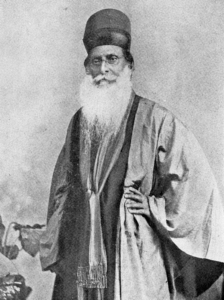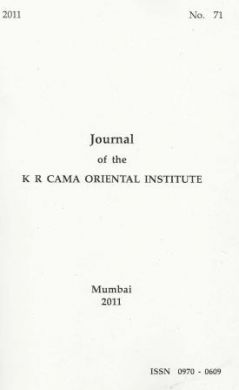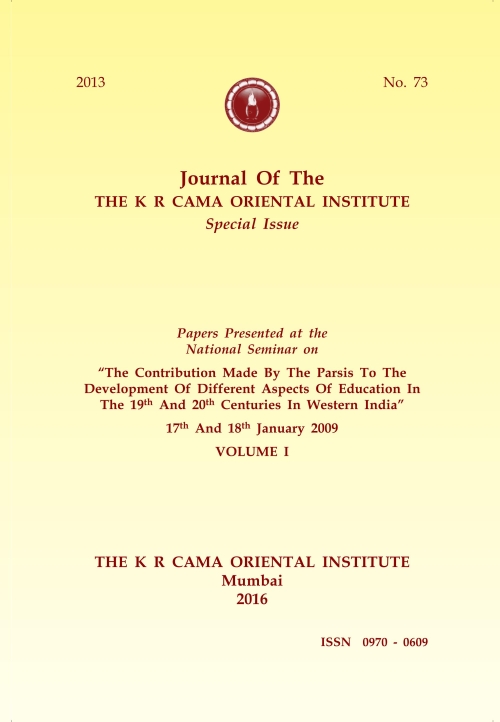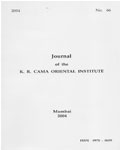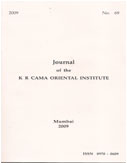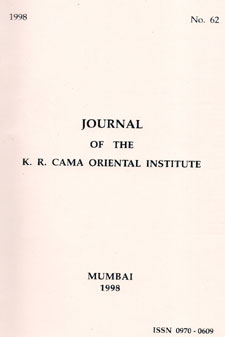Description
JOURNAL OF THE K R CAMA ORIENTAL INSTITUTE
No.71 (2011)
This issue of the Journal carries eight well-researched papers authored by eminent scholars from around the world.
Dr. Eva Aradi was awarded her Doctorate by the ELTE University, Budapest and taught Hindi and Indian Cuture there from 1976 to 1982. She presently teaches these subjects at the Asia Centre at PECS University, Budapest. She has been awarded several prizes in recognition of her mastery over Hindi by prestigious institutions in India and abroad. Her recent publications include The Huns in Indiaand The History of the White Huns.
Dr Aradi’s article titled “The Yu-echis, Kushans and Hephtalites” is a survey of the nomadic Central Asian tribes which invaded Bactria and what is today, Pakistan and North-West India.
Dr Naseeb Benjamin secured his Ph.D. from Jodhpur University in 1968 for his dissertation on Economic Programmes & Policies of The Indian National Congree (1885 – 1947.) He is presently a Visiting Fellow at the Gokhale Institute of Politics and Economics in Poona. He was awarded a Visiting Fellowship bt the University Grants Commission and has also been a Visitor to the School of Oriental & African Studies, London.
Dr Benjamin’s paper titled “Sir Ratan Jamsetji Tata: A Great Patriot and Philantrophist” is a biographical sketch of Jamsetji N. Tata’s second son.
Ms. Kolsoum Ghazanfari is presently a Ph.D. student at the Institute of Iranistik, Faculty of Philosophy, Georg-August University, Gottingen, Germany. Her dissertation is on Perceptions of Zoroastrian Realities in the Shahnameh: Zoroaster, Beliefs and Rituals. Shw has presented papers at several important international conferences, including the 6th European Conference of Iranian Studies in Vienna in 2007.
Ms. Ghazanfari writes on “The Zoroastrian Iconoclastic Movement in the Medieval Persian & Arabic Sources.” She finds that there is little information about this Movement, there being few documents related to the history of the faith.
Dr. James A. Jaffe is Professor of History at the University of Wisconsin – Whitewater. His most recent research is on the comparative history of the concepts and practises of equity, justice and fairness in early 19th century India and Great Britain.
Dr Jaffe writes on “Arbitration and Panchayats in Early Colonial Bombay.” He discusses the social, political and juridical relationship between the two institutions and how they evolved in India during the first half 0f the 19th century.
Dr. Sheryar Ookerjee began his career in 1949 as a lecturer in philosophy at the Wilson College, Bombay and retired thirty-six years later as Head of the Philosophy Department of that college. He continued as a post-graduate teacher at Bombay University for a number of years thereafter.
In 2001, Dr Ookerjee was invited by the City College of New York to conduct courses in political philosophy and on his favourite philosophers, Plato and F. H. Bradley.
Dr Ookerjee has been closely associated with the K. R. Cama Oriental Institute having served for a number of years as a member of the Institute’s Governing Council. In 2009, he delivered that year’s Government Research Fellowship Lectures in three parts on Plato and the Arthasastra. These lectures were later published in book form by the Institute.
On the 178th birth anniversary of Mr. K. R. Cama, Dr Ookerjee delivered a very well received lecture titled “All Rivers Flow into the Same Sea: Do They?” The contents of this lecture are reproduced in this Journal. The author notes that the difference between religions lie in the doctrinal part and the rituals. Each religion claims to be the ‘true’ religion. The fact that different religions do not say the same thing is no reason for conflict and violence. The author points out that it is our civic and human duty to live in peace and let others so live, in spite of differences. This is civilisation.
Dr Shereen Ratnagar specialised in the Mesopotamian period at the Institute of Archaeology, University of London. She later spent a year in Iraq as a Fellow of the British School of Archaeology. After receiving her Ph.D. degree from the Jawaharlal Nehru University, New Delhi, she was Professor of Archaeology there till 2000. Her seminal work, Trading encounters: From the Euphrates to the Indus in the Bronze Age was published in 2004 to high praise from her contemporaries.
Dr Ratnagar’s paper, Archives and Libraries in the Ancient Mesopotamian World stresses the importance of early Mesopotamia in world history. She notes that the West did not, until very recently, protect the archaeological heritage of Iraq. The sites of past cities and temples have been rifled for antiquities.
Dr Dan D Y Shapira teaches Ottoman and Iranian history at the Bar-Ilan University at Ramat Gan in Israel. His recent publications include Gleanings on Jews of Greater Iran under the Sasanians: According to the Oldest Armenian & Georgian Texts.
Dr Shapira’s article, “Sweat and Sleep: Notes on Pahlavi Intertextuality” is an attempt at identifying the methods of work of the Zandists, the translators of Avestan texts into Middle Persian and the ways in which the productsof the work of the Zandists were used by the compilers of Denkard 9 and the Bundahishn.
Dr Asiya Siddiqi was awarded a D.Phil. degree by Oxford University. She has taught in the History Department of Aligarh Muslim University and Bombay University. She has also been a Visitor at the University of Southern California. Her publications include Agrarian Changein a North Indian State: Uttar Pradesh.
Dr Siddiqi’s paper, “Sir Jamsetjee Jejeebhoy, Entrepreneur and Humanist discusses the manifold activities and achievements of Sir Jamsetjee. She describes his early days and his bold foray into China. She details the many philanthropic projects funded by this great son if India.

